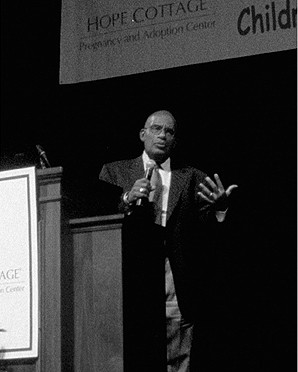
85 years of hope celebrated at SMU
Al Roker sounded like a stand-up comedian as he popped jokesabout being a part of a family made up of both adopted andbiological children.
In his family of three biological and three adopted children,all were considered equally.
“We never distinguished between our birth; we were simplyall brothers and sisters. Nor were distinctions made regardingmanners at the dinner table. Food went to whoever was thefastest,” Roker said. “For many years, I had fiveskinny siblings. After a while, the little ones gotquicker.”
Roker who is co-host, weathercaster and feature reporter onNBC’s “Today” show spoke at McFarland Auditoriumin support of Hope Cottages. Hope Cottage International’sprograms for pregnancy and adoption have helped families in theDallas area adopt children since 1918 and have been holding eventsto celebrate 85 years of helping families. More than 700 ticketswere sold to the event.
Roker spoke on what it was like growing up in a family withadopted children and being the father of adopted and biologicalchildren.
“When asked to speak on behalf of this terrific program, Iwas very excited,” Roker said. “In my family, therewere three biological children and three adoptedchildren.”
Roker said that the first time that his parents spoke to himabout adopting a brother or sister, he thought it was a little likethe new puppy that his friend next door had brought home.
“You know, you go somewhere, pick out something cute, playwith it for a little while, stick a dish of food in front of it,then put it on the newspaper,” Roker said. “I can tellyou, new baby brothers are not paper-trained!”
Roker also received a rude awakening about where the new babywould live. He said that at the time there was just his room andhis parents’ room. His assumption was the new little brotherwould go into the larger room — his parent’s.
“Wrong again!” Roker said.
Roker said that he loves his family dearly, and that they weresomething of a nuclear family.
“The house always looked like a nuclear bomb had gone offin it,” Roker said.
However, it was his mother who was the controlling andsupporting figure in the family.
“Mothers never forget anything,” Roker said.”When I was 16, I came in from school one day and saw momsitting at the dining table with kind of a funny look on her face.She looked up at me and said, ‘Al, how would you like a newbaby brother or sister?'”
“Cool! Are we going to adopt?”
“No,” she said.
“Are we going to foster more children?” I askedexcitedly.
“No,” she said.
“I thought about it. Let’s see. She isn’tgoing to adopt, and she isn’t going to foster. What’sleft?”
“Then the thought occurred to me. Oh my god, my mother waspregnant! My parents had been doing it! No teenager thinks of hisparents that way. That’s disgusting,” Roker said.
Roker turned to his mother and told her that she couldn’tbe pregnant — she was too old! She was about 32 yearsold.
Later, Roker’s words would come back to haunt him.
Roker married Debra Roberts of ABC News, and Leila and Nick cameinto their lives. When Roker was looking at Nick in the window inthe hospital, Roker couldn’t contain his joy. His motherstood beside the then 49-year-old Roker.
“After looking proudly at my son, my mother turned to meand said, ‘You’re too old to have a child. Think of howold you will be when that boy is 16.'”
“A mother’s revenge knows no time limits,” hesaid.
Roker pointed out that people don’t know how theirchildren will turn out.
“As I look at my children, I almost get dizzy thinking ofwhat is to come: school, friends, heartache, dating, college,marriage, babies and them dealing with their crazy oldfather,” Roker said.
Roker credited places like Hope Cottage with providing him goodfortune.
“It is because of Hope Cottage and places like it that Ihave had the joyous good fortune to have lived a full lifesurrounded by diverse people I might never have met. People like mysiblings and children,” Roker said. “This is a causethat I encourage everyone to support.”
Hope Cottage held a parade and a number of seminars forprospective parents, children hoping to be adopted and children whoare part of a family that is hoping to adopt.
A special guest at Roker’s lecture was Eva J. T. Carsonwho was adopted out of the Dallas Hope Cottage in 1921. Carson wasthe oldest adoptee present. She was accompanied by her daughter,Kathy Carson Rogers, also an adoptee from Hope Cottage.
Roker received a special award from Hope Cottage for hissupport. He is the fourth person to be given this award.
The first recipients were Roy Rogers and Dale Evans, who hadadopted two children from Hope Cottage.
The third recipient was writer Robert Fulghum of All I ReallyNeed to Know I Learned in Kindergarten fame.
Roker is the author of Don’t Make Me Stop This Car!Adventures in Fatherhood, as well as several cookbooks.
For more information on Hope Cottage, contact Shana McCracken at(214) 526-8721 or visit the Web site at www.hopecottage.org.
For more information on Al Roker:http://www.roker.com/main.cfm.












